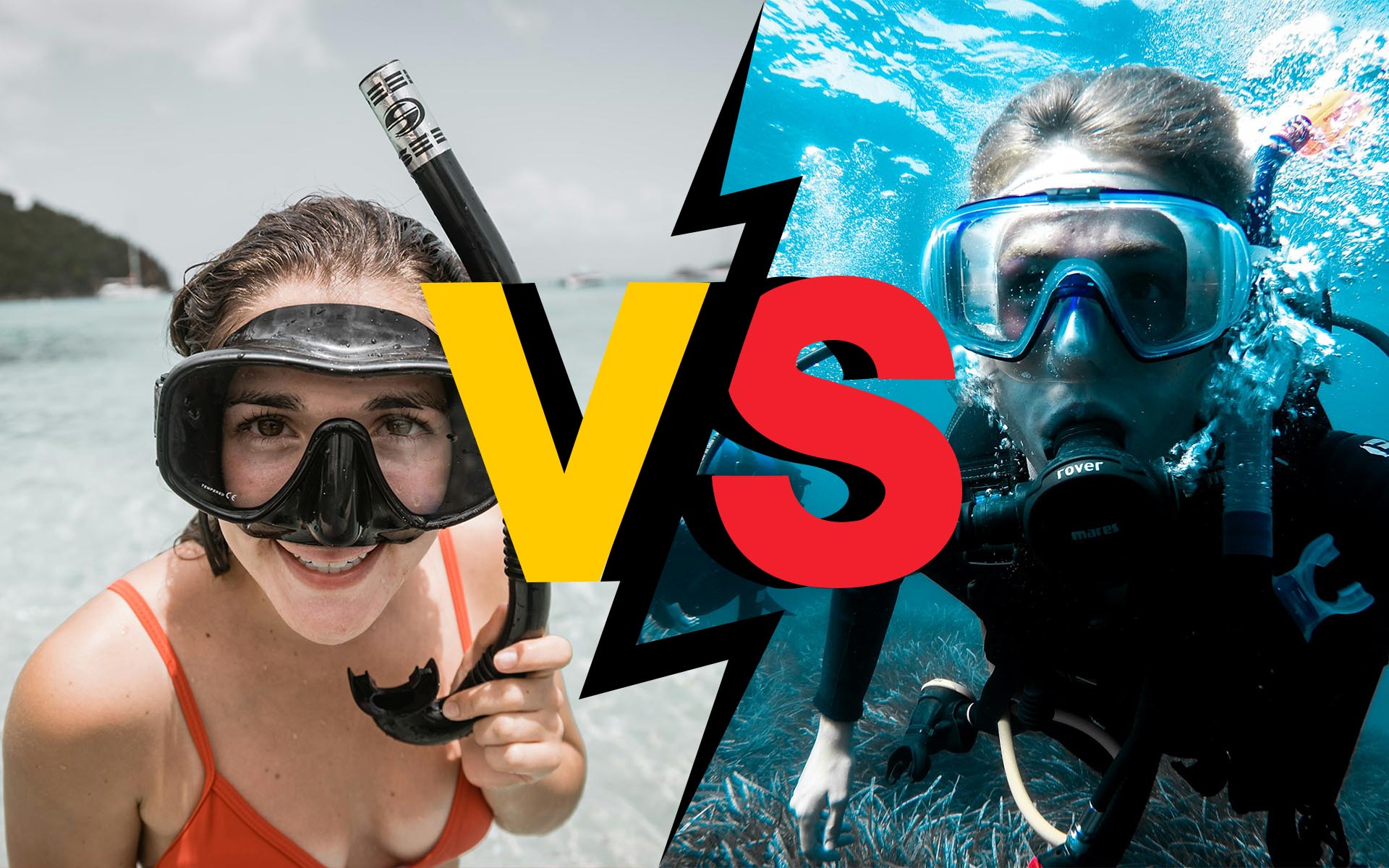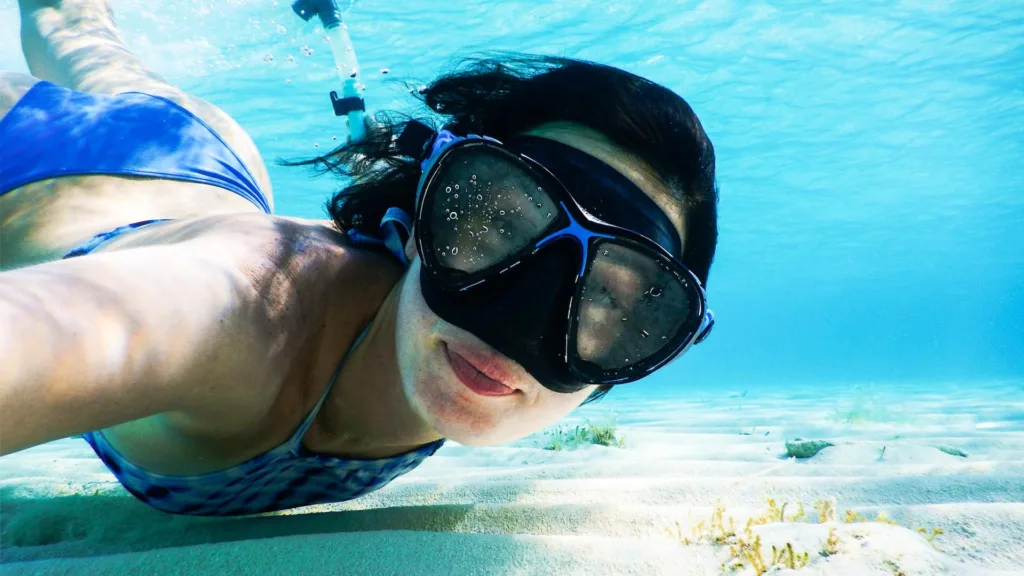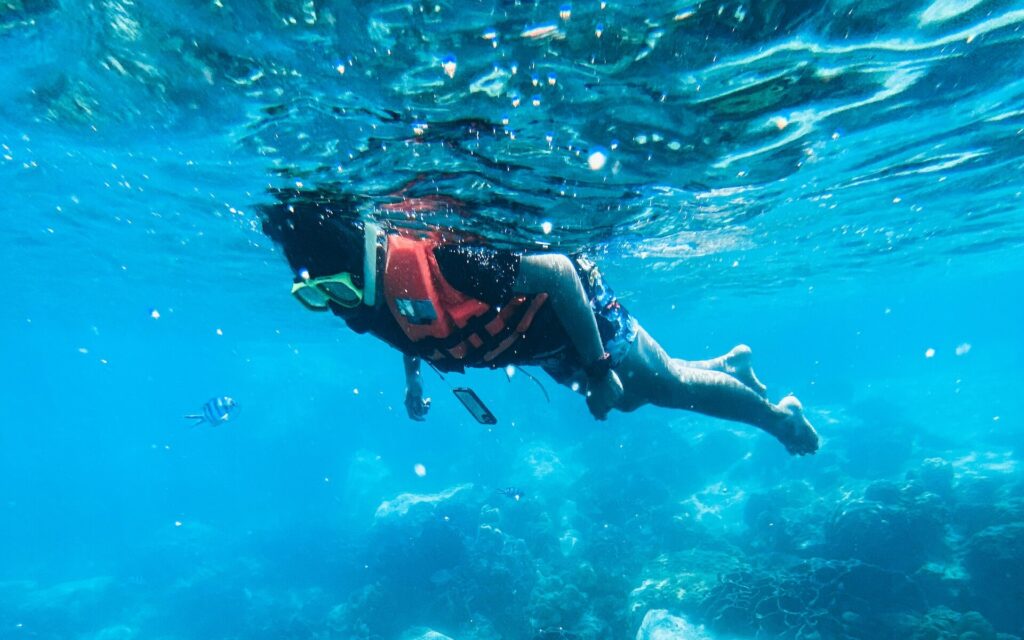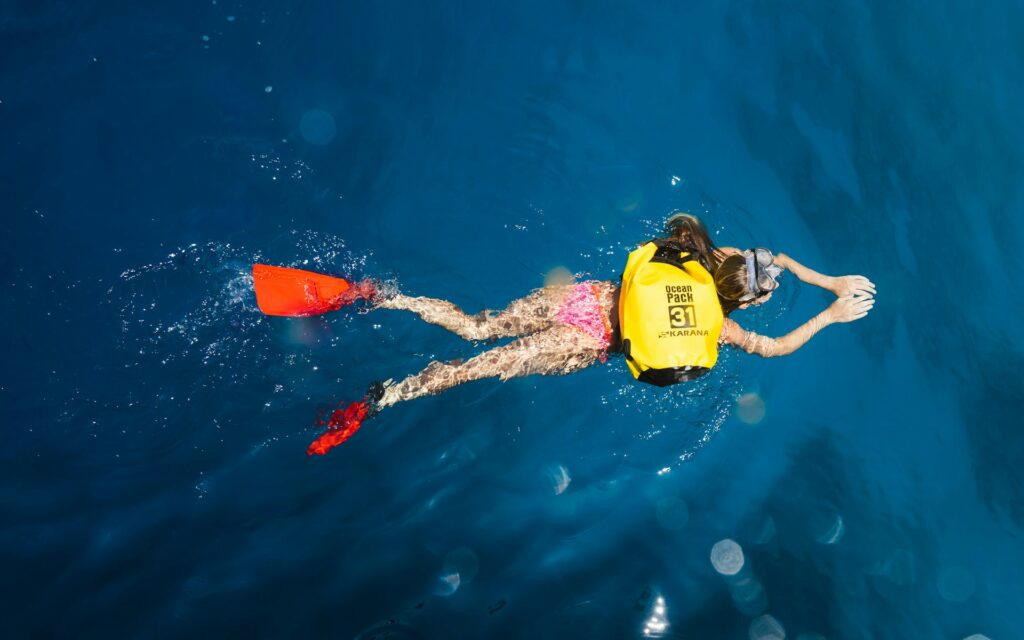Hey explorers, are you looking for fun ways to explore the underwater world? Cannot decide between snorkeling and scuba diving?
Do not worry; we have got you covered. There are pros and cons to both these fun activities. And the experience you get from each is totally different from another. In this article, we will focus on snorkeling vs scuba diving, how they are different, how they are similar, their pros and cons, which is better, and how they work for non-swimmers. We will also clear up some frequently asked questions about snorkeling and scuba diving.
Snorkeling vs scuba diving: A battle under the waves
Let us start this article’s journey with the difference between snorkeling and scuba diving. You might see both these fun sea activities similar at first. But if you look closely, you can notice there are a few major notable differences between them. Such as depth and duration, Training and Certification requirements, Varias cost, Physical fitness, and Risk. Let’s talk about how each of these fun sports differs.
01. Depth and duration of underwater exploration
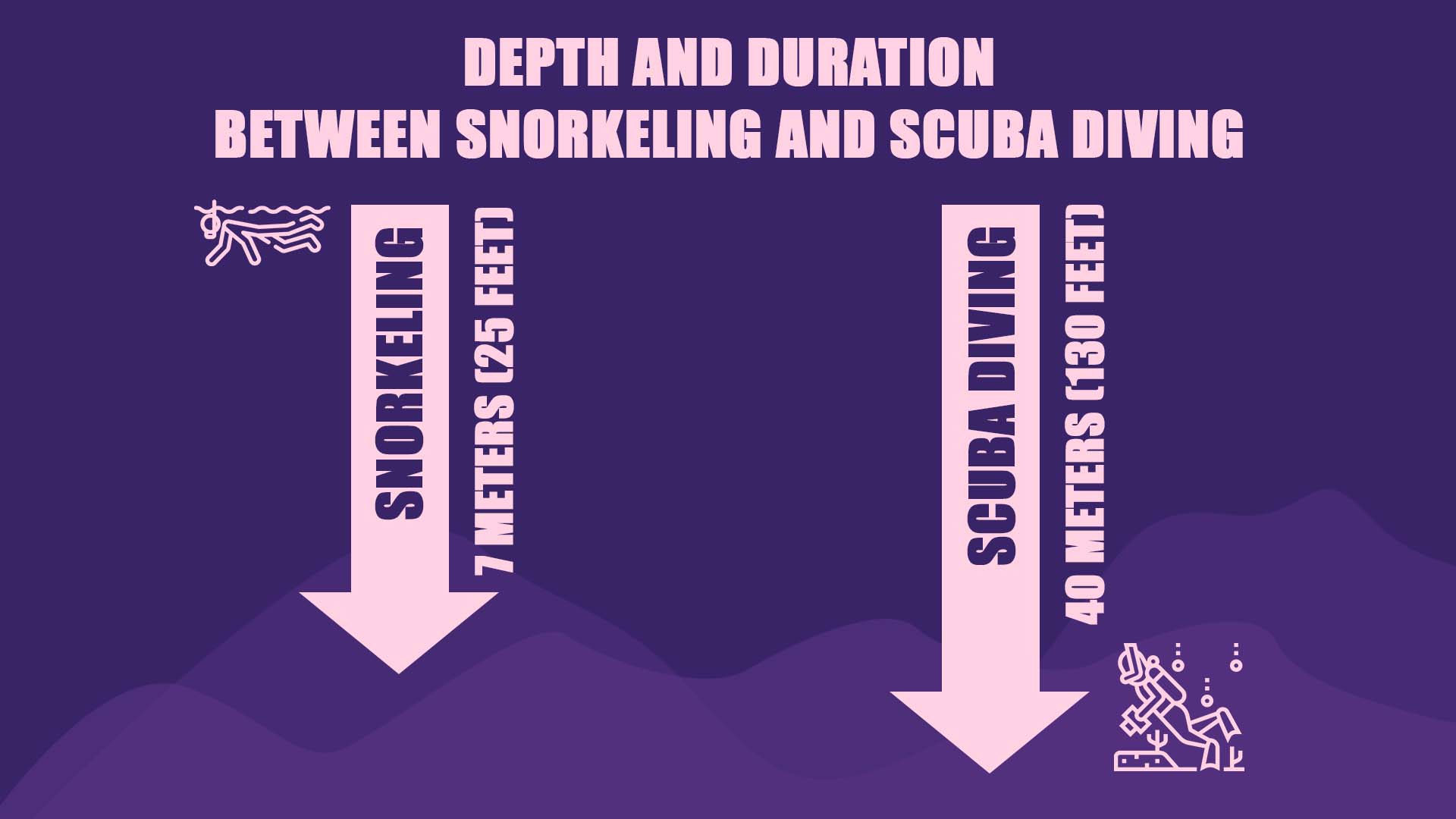
Main scuba diving and snorkeling difference is how deep and how long you can stay underwater. It is all about hanging out on the surface. You use a mask and a snorkel to swim around near the surface and check out the underwater world. The average snorkeler can dive down to about 3-4 meters (12-15 feet), while the pros can get down to about 7 meters (25 feet). But you can only stay underwater as long as you can hold your breath, and you need the water to be calm and clear to see anything.
On the other hand, scuba diving is all about going deep underwater. When you scuba dive, you use a special device called a self-contained underwater breathing apparatus (SCUBA) to breathe air from a tank you carry on your back. With its help, you can stay underwater longer to enjoy the sights and sea creatures. How long you can enjoy underwater depends on how much air you use and your dive plan. And the best thing is the depth. Experienced divers can dive as deep as 40 meters (130 feet). So, nothing is stopping you from checking out coral reefs, shipwrecks, caves, and more.
Stay connected! Join us on WhatsApp!
Connect with us directly on WhatsApp for instant updates! Tap the button below to join our WhatsApp community and stay in the loop with all the latest news and Updates.
02. Training and certification requirements
This is another noticeable difference between scuba diving and snorkeling. Snorkeling is pretty simple. If you can swim, you can snorkel. You do not need any official training or certification. You just need to be okay in the water and know how to use your equipment.
Scuba diving, on the other hand, needs more training and certification. You cannot just strap on a scuba tank and dive in. You have to learn how to,
You also need to follow a few rules to dive safely and avoid decompression sickness.
Another thing is the certification. Before you scuba dive, you need to complete a scuba certification course from a reputable agency like PADI. The most common course for beginners is the Open Water Diver course. There, you will have theory sessions, pool sessions, and open water dives. This course takes about 3-4 days, and once you are done, you can dive up to 18 meters (60 feet) with a buddy.
Do you want to go further and explore more?
Then you can take more advanced courses.
How old do you have to be to scuba dive? Check out our previous article here for more information on age requirements for scuba diving.
03. Various costs
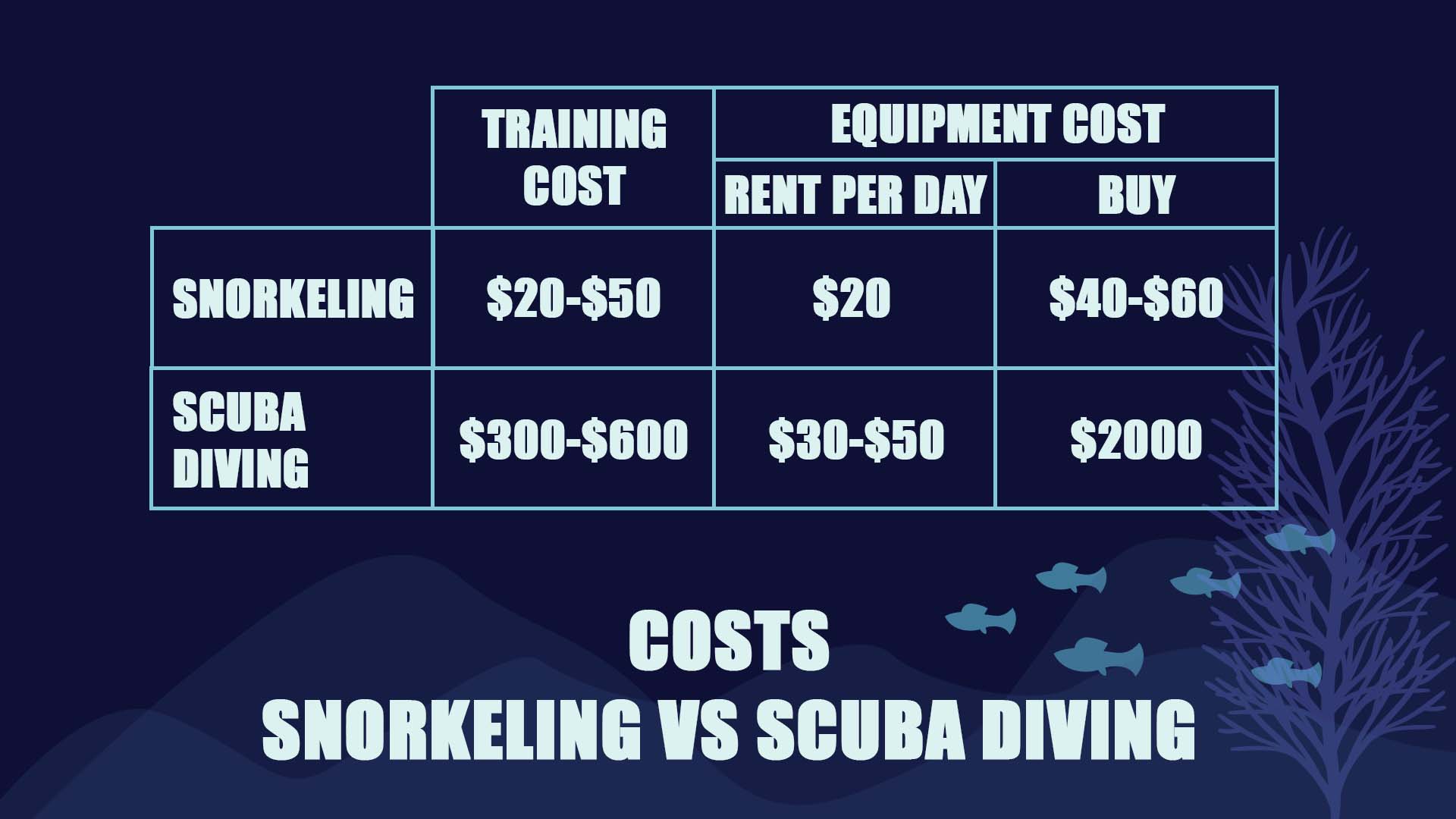
Usually, snorkeling is cheaper than scuba diving because it needs less equipment and training. You just need a mask, a snorkel, and fins for snorkeling. You can get these for about $40-$60 USD or rent them for less than $20 USD a day. You might also need a wetsuit or rash guard, depending on the water temperature and weather.
Scuba diving needs more equipment. You need a mask, fins, a regulator, a buoyancy control device (BCD), a dive computer or gauge, and a scuba tank. You can buy all this for about $2000 and more or rent it for about $30-$50 USD a day. You will also need a wetsuit or drysuit, depending on the water temperature.
Training and certification costs
Training and certification for snorkeling is pretty much free. You can learn from a friend, a book, or a video. But if you want to take a course or join a guided tour, there is a cost. Of course, you will have to spend about $20-$50 USD.
Training and certification for scuba diving is pricier than snorkeling. You need to take a course from a certified instructor and pay for the course materials, the pool sessions, and the open water dives. You would have to pay about $300-$600 USD for an Open Water Diver course. You also need to pay for the certification fee. It will cost you about $30-$50 USD.
Check out snorkeling training and certification costs in UK here.
04. Physical fitness
You need to be healthy and fit to do both activities safely and comfortably. But if you scuba dive, you need to be fitter because of the depth and pressure. You should be able to comfortably swim and float for snorkeling. So, you can swim back to the shore or boat if you ever get carried away by the currents. Your heart should be healthy, and your lungs should be well to hold your breath and dive down. You should not snorkel if you have any ear or sinus issues.
And for scuba diving, you should be able to swim at least 200 meters (656 feet) comfortably and float for 10 minutes. Your heart should be healthy, and your lungs should be well to breathe compressed air and handle the extra oxygen and nitrogen in your blood. Do you have any conditions that affect your heart, lungs, blood, or nervous system? Or do you have any ear or sinus issues?
Then, you should not scuba dive.
05. Safety risks
Snorkeling or scuba diving both have their own risks and hazards. So it is always a good idea to learn and be prepared for them. But scuba diving can be a bit riskier than snorkeling because it is deeper and more complex. Here are some usual risks and hazards of snorkeling. You could,
Join our newsletter for everyday updates!
Here are some usual risks and hazards of scuba diving. You could,
Snorkeling and scuba diving similarities
Despite their differences, snorkeling scuba diving have a lot in common. In
Scuba diving vs snorkeling for non swimmers
So, you are not a great swimmer or cannot swim at all? But are you thinking if you can still snorkel or scuba dive? Well, it really depends on the activity, where you are doing it, and you.
Let us talk about snorkeling for non swimmers first. Even if you’re not a swimmer, you can still enjoy snorkeling if you wear a life jacket or a flotation device to keep you on the surface. You also need to be okay in the water. Do not freak out if you get a bit of water on you or go under. You should also choose a shallow, calm, and clear spot to snorkel. And it is always better to have a guide or a buddy to help you out if you need it.
Do you need to know how to swim to snorkel? Check out our article here for more detailed information on whether you need to know how to swim to snorkel.
Now let’s talk about scuba diving for non swimmers. Even if you’re not a swimmer, you can still try it if you take a beginner course or a discovery dive with a certified instructor. You also need to be healthy and fit enough to handle the pressure and the equipment. Also, make sure to learn and follow scuba diving rules and safety procedures.
Answers For Frequently Asked Questions
Here are answers to some of the most asked questions about snorkeling and scuba diving.
Conclusion
Snorkeling and scuba diving are both fantastic ways to explore the underwater world and have a great time. We compared snorkeling vs scuba diving in this article and found out their different features, benefits, drawbacks, and requirements. Try both and see which one you like more to figure out your passion. But whichever one you go for, make sure you do it safely, responsibly, and with respect.
